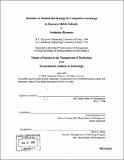Dynamics of market and strategy for competitive advantage in Japanese mobile industry
Author(s)
Hiramoto, Yoshitaka, 1969-
DownloadFull printable version (5.230Mb)
Other Contributors
Massachusetts Institute of Technology. Management of Technology Program.
Advisor
Henry Birdseye Weil.
Terms of use
Metadata
Show full item recordAbstract
The objective of this thesis is to analyze the dynamics of the mobile industry and propose tools that will help create robust strategies to establish competitive advantage. In the mobile industry, competition is so keen that it is extremely difficult for mobile operators to maintain their competitive advantage for a long time. Therefore mobile operators need a clear view of the industry in order to develop strategies that will help them survive the keen competition. The tools proposed in this thesis should provide insights into the dynamics of the mobile industry. First, two concepts, "Double clockspeed" and "Three phases within system generation," are introduced. Not only must mobile operators improve their current systems but they must also keep in mind the need to migrate to the next-generation system. Therefore these companies should take into consideration double clockspeed as it relates to the clockspeed of system generation, and the clockspeed of service. On the other hand, an analysis of the mobile industry shows that there are three phases, "Initial Phase", "Differentiation Phase", and "Commodity Phase," within the system generation, and the dynamics of the mobile industry change according to the length and timing of these phases. These two concepts are extremely important for understanding the dynamics of the mobile industry. Then, a dynamics model of the Japanese mobile industry is proposed, based on the market analysis and the introduced two concepts. This dynamics model is based on the concepts of System Dynamics, which will help us understand the complexity of the mobile industry. Finally, the proposed dynamics model is applied to the current Japanese mobile industry, and possible scenarios for each mobile operator are analyzed. (cont.) In addition, possible scenarios of mobile operators versus wireless LAN systems are also investigated, since these systems could become a disruptive technology in the near future, and mobile operators will need to create robust strategies to compete against them.
Description
Thesis (S.M.M.O.T.)--Massachusetts Institute of Technology, Sloan School of Management, Management of Technology Program, 2004. Includes bibliographical references (leaves 129-130).
Date issued
2004Department
Management of Technology Program.; Sloan School of ManagementPublisher
Massachusetts Institute of Technology
Keywords
Management of Technology Program.